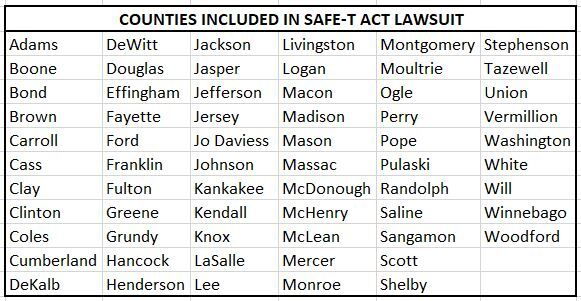Judge invalidates cash bail reform in some counties; Supreme Court appeal pending

SPRINGFIELD – A Kankakee County judge ruled Wednesday that lawmakers overreached their constitutional authority in passing a measure to abolish cash bail in Illinois, while other provisions in the wide-ranging SAFE-T Act criminal justice reform were not affected by the ruling.
The ruling by Judge Thomas W. Cunnington leaves the impending cash bail reform in limbo in at least 64 of Illinois’ 102 counties that had joined the consolidated lawsuit ahead of the reform’s scheduled Jan. 1 implementation.
The reform remains scheduled to take effect in the more than 30 counties that did not sue, which contain roughly two-thirds of the state’s population. Of the state’s 10 most populous counties, six were not part of the lawsuit (Cook, DuPage, Lake, Kane, St. Clair and Champaign). The counties of Will, McHenry, Winnebago and Madison were all part of the lawsuit.
The ruling did not invalidate other provisions of the SAFE-T Act which had already taken effect, such as reforms to police officer training and certification standards and police body camera requirements.
Cunnington wrote in a 36-page decision that the cash bail provisions effectively and improperly amended a section of the state’s constitution that states, “all persons shall be bailable by sufficient sureties,” except in a few specific circumstances.
He also wrote that ending cash bail is an improper overreach by lawmakers, who have no constitutional authority to govern the administrative functions of Illinois courts due to the separation of powers. Bail, Cunnington wrote, has been held by the Supreme Court to be “administrative” in nature.
The constitution also specifically mentions bail in a section on victims’ rights, when it states victims have a right “to have the safety of the victim and the victim’s family considered in denying or fixing the amount of bail.” Cunnington found that eliminating bail prevents courts from “effectuating the constitutionally mandated safety of the victims and their families.”
Illinois Attorney General Kwame Raoul said in a news release the state will appeal the decision directly to the state Supreme Court, but a timeline for a ruling from the high court is unclear.
“Most of the SAFE-T Act’s provisions have been in effect for more than a year, and regardless of today’s circuit court decision, all parts of the SAFE-T Act, including the pretrial release portions addressed in the court’s decision, will go into effect Jan 1,” Raoul said. “For instance, the right of individuals awaiting criminal trials – people who have not been convicted of a crime and are presumed innocent – to seek release from jail without having to pay cash bail will go into effect in a few short days, despite the court’s ruling against those provisions.”
Cunnington rejected other arguments by the dozens of state’s attorneys that centered on the legislative process, namely that the bill was not given a proper hearing and violated the “single subject” rule. Court precedent holds that as long as the House speaker and Senate president certify that a bill is properly passed, courts have no standing to intervene, he wrote.
Miss Clipping Out Stories to Save for Later?
Click the Purchase Story button below to order a print of this story. We will print it for you on matte photo paper to keep forever.

